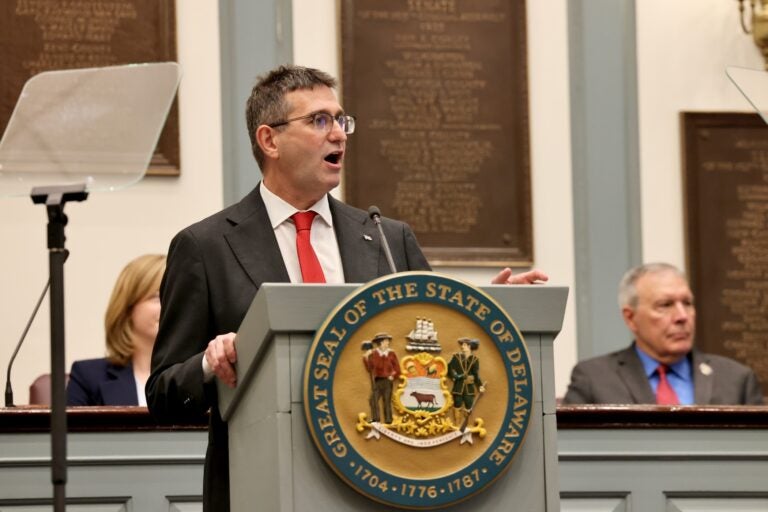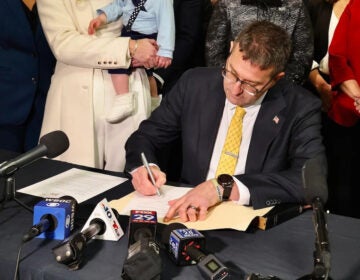‘Rocky start’: Progressives say Delaware Gov. Meyer’s transparency efforts are a mixed bag
Advocates had hoped Gov. Meyer and progressive lawmakers would introduce significant transparency initiatives this year.
Listen 1:00
Delaware Gov. Matt Meyer delivers his first State of the State address, April 10, 2025. (Emma Lee/WHYY)
From Philly and the Pa. suburbs to South Jersey and Delaware, what would you like WHYY News to cover? Let us know!
Delaware progressives and open government advocates saw last year’s election as a chance for transformative change in how the state government runs. With a new governor and lawmakers, it was a chance to throw open the curtains and let in some sunlight, increasing transparency in how state agencies work.
But nearly six months into Gov. Matt Meyer’s administration and one month before lawmakers call it quits for the year, political followers say the results so far are a mixed bag. Meyer did not agree to an interview with WHYY News on his administration’s transparency efforts.
“It’s been a very rocky start for the governor, especially for the governor and his relationship with the General Assembly,” said Steve Tanzer, a former legislative staffer who now writes for the political news blog DelawareLiberal.net and has also campaigned for progressive state House and Senate candidates. “I don’t see any other way to look at it.”
Meyer and state senators have been engaged in a tug of war over who will control the direction of the Port of Wilmington and the $635 million port expansion that has yet to get off the ground. Meyer and Senate Democrats went to court earlier this year over whether he could withdraw the port board nominees of former Gov. Bethany Hall-Long, who offered names to the Senate during her two-week stint as governor.
John Flaherty, spokesperson for the Delaware Coalition for Open Government, or DELCOG, said he is pleased with the governor’s first steps. Meyer has championed legislation creating an inspector general office, the main goal of DELCOG this session. Creation of the office, which would be charged with investigating abuse, waste and corruption, has been approved by the Senate and is awaiting consideration in the House.
“I’m very optimistic and I’m not disappointed at all,” he said. “I’m glad that he got elected and particularly his support for the inspector general.”
Campaign promises
While campaigning last year, Meyer promised a new level of transparency if elected to the state’s top job. Advocates had said they hoped the new administration would support significant changes, including reducing exemptions where documents can be withheld from the public or narrowing how agencies apply them, overhauling the police bill of rights and making legislators’ emails subject to public view.
The public’s appetite for increased transparency was whetted after numerous scandals and coverups, including WHYY News’ exclusive report of government cover-ups of missing taxpayer funds, campaign finance violations and lack of police reports released to the public on the arrests of a former top state cabinet member on shoplifting charges as well as a state lawmaker charged with driving under the influence and vehicular assault.
Meyer has not voiced support for reducing exemptions where documents can be withheld from the public or narrowing how agencies apply them since taking office.
The state’s Freedom of Information Act applies to public bodies and requires access to documents and meetings unless they fall under one of the exemptions. Those include criminal records, investigative files and autopsy records. That means police reports, inmate causes of death and restitution paid to victims are excluded from public disclosure. As are legislators’ emails.
Meyer’s transition website said transparency was a key priority he would focus on “by improving public access to government operations and expenditures, closing lobbying loopholes, enforcing stricter campaign finance regulations, and strengthening oversight of elected officials.”
“Together, we can create a more open, accountable government that serves the interests of all Delawareans,” it states.
Shortly after taking office, the governor issued an executive order on ethical, transparent and effective government. It required state agencies to review where services could be improved and submit a report to the governor’s office within 90 days. A draft plan to develop a statewide policy for ethics training for state employees was due April 1. Meyer’s spokesperson said the governor’s office is reviewing recommendations for service improvements and a policy to augment the existing ethics training requirements.
Meyer voiced concerns on the campaign trail that Delaware’s 19 FOIA exemptions were possibly being misused. Of particular concern at the time was revelations that then-candidate for governor Hall-Long had tried to shield a report that said she failed to properly disclose campaign loans from public disclosure.
“I can think of situations where we would want some FOIA protections, or for situations under investigation,” he said in October. “But I think it’s being too often used today to withhold information that the public has a right to know.”
He said when in office he would review Delaware’s FOIA exemptions to ensure they’re not being misused. Meyer’s Director of Communications Mila Myles said they have found no abuses of the FOIA exemptions by state agencies.
Meyer’s administration has been criticized by state lawmakers and labor union members for not providing more detail on the state’s attempts to get permits reissued for the Edgemoor container terminal project at the Port of Wilmington. Cabinet secretaries have largely not attended meetings of a task force set up by state lawmakers on the port expansion and the governor and Senate Democrats have bickered over port nominees.
“He’s done stuff that has unnecessarily turned people off,” Tanzer said. “I would say more just his manner, much less his positions on things, because he is not being that transparent.”
Transparency legislation
Tanzer and Flaherty pointed to pieces of legislation they said showed state lawmakers were making strides in letting some sunlight through the clouds.
A bill sponsored by state Rep. Kim Williams, D-Stanton, would require Delaware colleges and universities funded by the state to keep and supply employment records of elected or appointed state officials who work there. It follows a 2024 audit report where Auditor Lydia York found that at least six current and former state lawmakers were potentially double-dipping, working two taxpayer-funded jobs at state or local government entities at the same time. The University of Delaware told the auditor’s office it did not have to comply with a 1986 state law requiring employers using taxpayer dollars for payroll to ensure officials are not paid for two jobs at one time.
Lawmakers have also introduced a slate of five bills aimed at increasing school board transparency:
- House Bill 33 would mandate school boards offer remote attendance options to school board members who are dealing with issues like illness, military deployment or pregnancy.
- House Bill 82 would set residency requirements to serve on school boards.
- House Bill 64 would require school boards to provide a remote option for the public to view and comment during public meetings remotely.
- House Bill 85 would require school board members undergo background checks.
- House Bill 78 would have all school boards receive training on good government topics like, FOIA, rules for conducting meetings and codes of conduct.
All of the measures except the last one have passed the House and are waiting for a floor vote in the Senate.
The school board bills have been largely inspired by the Christina School Board FOIA violations during its public meetings over the past year. There have also been residency concerns about Christina School Board member Naveed Baqir, who has been attending meetings virtually while living in Pakistan since January 2024. The General Assembly required the Delaware Department of Justice in the fiscal 2025 budget to monitor the school board meetings and submit a report due in July.
House Speaker Melissa Minor-Brown has also introduced legislation that would create a new subcommittee to review new Grant-In-Aid applications and ensure existing grants meet eligibility requirements.
“They’re making some progress,” Tanzer said. “But it’s not that much. They could do a lot more.”
Wish List
Flaherty said that after DELCOG successfully lobbies for the creation of the Inspector General Office, the group plans to again push to make legislators’ emails public documents. The legislature exempted its emails from public view in 2009.
“I would hope that that would be a priority for us and for a lot of other organizations in the near future, because I can see no basis for the privacy of emails,” he said. “It just doesn’t make any sense to me.”
Flaherty also said the governor should be more transparent by releasing a calendar of who he is meeting with and speaking to. Former Gov. John Carney released a calendar of his daily activities until the pandemic started in 2020. Meyer told WHYY News last November after being elected governor it was something he was open to. Myles said a public schedule was in discussions.
Flaherty also said he also believes gift and lobbyist requirements should be tightened.
This story was supported by a statehouse coverage grant from the Corporation for Public Broadcasting.

Get daily updates from WHYY News!
WHYY is your source for fact-based, in-depth journalism and information. As a nonprofit organization, we rely on financial support from readers like you. Please give today.







